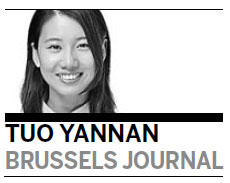Finding the best route for no-risk relations
Updated: 2013-02-08 09:35
By Tuo Yannan (China Daily)
|
||||||||
My first trip to the European Union started with a rather worrying announcement by the captain of my Lufthansa flight.
"We have just found that we are waiting for our departure on a wrong runway," he told the packed cabin.
It appeared the one we were on, was too short for our Airbus 380.
"We will keep on waiting, because I don't want to risk a takeoff. I'll get you there safe, though we might be delayed."
There was great relief among the passengers.
But when I thought about it, his broadcast nicely summed up what's happening in Europe at the moment, and the issues facing the relationship between China and the EU.
European leaders were gathering in Brussels on Thursday for two days of talks on the EU's Multi-Annual Financial Framework for 2014-2020, after discussions were suspended at the European Council last November.
That earlier meeting in November failed to reach a consensus on the long-term budget.

There were still important differences of opinion on a number of key issues, especially the overall size of the budget and the fairness of the distributions between member states.
Back then, the talks broke down because agreeing at the time would certainly have represented their own "risky takeoff", with Greece's financial crisis at its peak, and Britain's announcement of a possible referendum to quit the EU.
There was a need to find the "right runway", to make sure the route was right.
As for China, it has already become the right "destination" for many countries in the struggling economic area.
It has become the EU's second-largest trading partner, behind the United States, and the EU is China's biggest trading partner, according to official data.
Europe has claimed consistently that it is committed to open-trade relations with China. But in fact, the EU's China policy has seesawed continually.
Noticeably consistent, however, are growing efforts across the EU to improve communications with China, and a striking change has been the number of officials and employees starting to learn Chinese.
The number of trade investigations against Chinese goods and services may have increased, but so too have the number of people enthusiastic about learning all they can about China, and its influence on the global economy.
It used to be that French, German and Spanish courses were the most popular among EU commission staff, but as one education program official told me recently, Chinese and Arabic are now the new language lessons of choice.
Contact the writer at tuoyannan@chinadaily.com.cn
- Hollande calls for structural reform ahead of EU summit
- China extends anti-dumping duties on EU starch
- Netherlands support Croatia's EU bid
- China imposes anti-dumping duties on US, EU monobutyl ether
- UK break from EU may hurt China trade
- Germany to help seek compromise with British on EU
- EU remains a big external challenge to China's economy
- China and EU need stable trade relations
- EU leaders cautiously optimistic about 2013
- China urges EU to refrain from telecom protectionism

 Li Na on Time cover, makes influential 100 list
Li Na on Time cover, makes influential 100 list
 FBI releases photos of 2 Boston bombings suspects
FBI releases photos of 2 Boston bombings suspects
 World's wackiest hairstyles
World's wackiest hairstyles
 Sandstorms strike Northwest China
Sandstorms strike Northwest China
 Never-seen photos of Madonna on display
Never-seen photos of Madonna on display
 H7N9 outbreak linked to waterfowl migration
H7N9 outbreak linked to waterfowl migration
 Dozens feared dead in Texas plant blast
Dozens feared dead in Texas plant blast
 Venezuelan court rules out manual votes counting
Venezuelan court rules out manual votes counting
Most Viewed
Editor's Picks

|

|

|

|

|

|
Today's Top News
Boston bombing suspect reported cornered on boat
7.0-magnitude quake hits Sichuan
Cross-talk artist helps to spread the word
'Green' awareness levels drop in Beijing
Palace Museum spruces up
First couple on Time's list of most influential
H7N9 flu transmission studied
Trading channels 'need to broaden'
US Weekly

|

|







